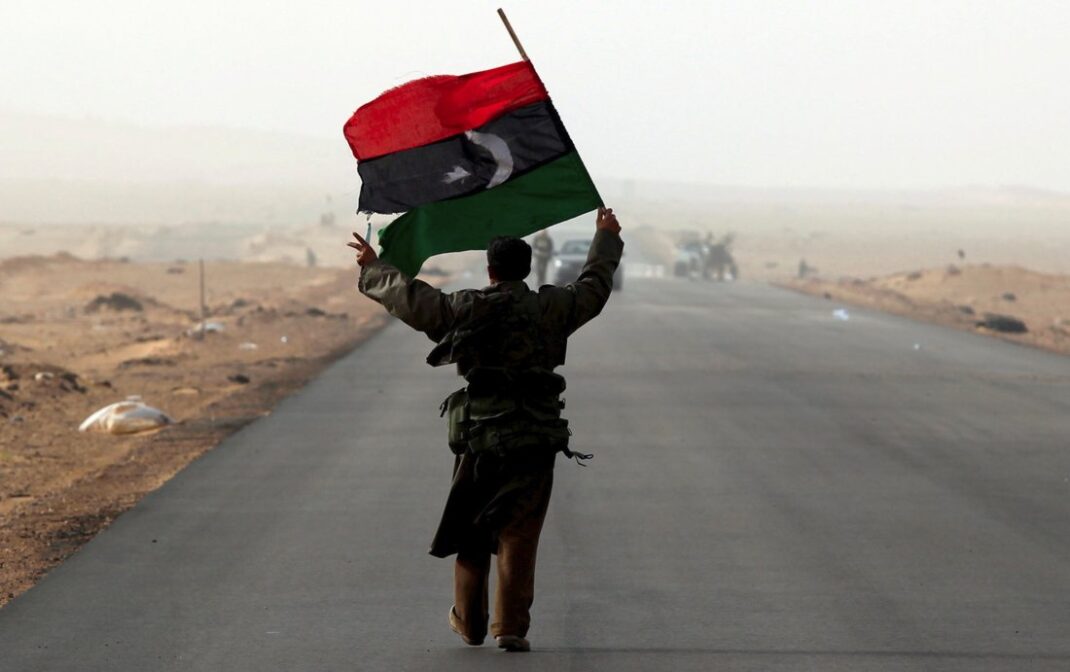Florence Gaub
 The Libyan revolution had all the ingredients of a success story: civic courage, far-reaching international support and widespread popular desire for political freedom, human rights and democracy. Yet it remains far from realising the peaceful transition to democracy many hoped would occur.
The Libyan revolution had all the ingredients of a success story: civic courage, far-reaching international support and widespread popular desire for political freedom, human rights and democracy. Yet it remains far from realising the peaceful transition to democracy many hoped would occur.
PART (IV)
A culture of vengeance
In contrast to Libya’s security sector, which began the post-conflict era in a difficult position, at the political level there initially seemed more reason for hope.
Speaking at the ceremony marking the liberation of the country, Jalil asked Libyans ‘for forgiveness, tolerance and reconciliation. We must get rid of hatred and envy from our souls. This is a necessary matter for the success of the revolution and the success of the future Libya.’
But while a discourse of reconciliation dominated the early days of Libya’s new republic, vengeance soon emerged as the defining feature of the political landscape.
Thousands of inmates, suspected to be supporters of the former regime, languish without trial in militia-controlled prisons; death sentences have been handed down to former regime officials, such as Ahmad Ibrahim, Gadhafi’s education minister; and international arrest warrants have been issued for hundreds of Libyan exiles living in other Arab countries and Europe.
The Libyan justice system seemed at first to be the branch of government least affected by the regime change, as the Supreme Court distanced itself from Gadhafi in the early days of the uprising and played a moderating role in the aftermath of the conflict.
The system has also become a target of vindictive rhetoric, however, and is often seen as loyal to the previous regime.
As a result, justice in Libya is now either handled by militias or ordinary civilians, and the few court trials that do take place are heavily politicised.
These factors led the International Criminal Court to conclude that the country was incapable of providing Saif al-Gadhafi with a fair trial.
Libya does not have a transitional judicial strategy and, as in the security sector, such legal process as there is centres mainly on ad hoc or anti-Gadhafi policies that ignore the consequences of such a vengeful course.
Following the end of the conflict, the country’s 12-member Commission for Integrity and Patriotism, created by the NTC, began vetting officials and civil servants using very broad criteria.
Their work even covered academics who had carried out research for Gadhafi’s Green Book.
After barring from office several ministers and members of parliament, and the heads of the Libyan Olympic Committee and the country’s air force, the commission was criticised for its imprecision.
The ‘political isolation’ law, which was adopted in May 2013 after militias besieged several government ministries in support of the measure, codifies the commission’s approach.
It stipulates a ten-year ban from office for anyone who is associated with the former regime or ‘took a position against the 17 February revolution in deed, by incitement or by financial support’.
The law therefore allows individuals to be punished on the basis of their associations rather than criminal acts proven in court.
It is sufficiently vague to invite arbitrary interpretation and is protected from judicial review because it was added to the Constitutional Declaration.
The law fails to discriminate between former officials who supported the revolution and those who did not, and impedes national reconciliation, worsening brain drain in emerging institutions.
As a result of the law, GNC Chairman Mohammed Magarief was forced to step down, as were several other ministers, and further dismissals across the government were expected in subsequent months.
In the Libyan armed forces, no officer who commanded a unit in Gadhafi’s army was permitted to serve, making the search for a successor to Mangoush particularly difficult.
Various integrity commissions are currently combing Libya’s institutions: the Commission for Integrity and Patriotism vets political personnel, while the Military Integrity Commission, created in March 2013, focuses on the armed forces.
Although the extent to which the new law will be applied remains unclear, it has the potential to be more far-reaching than Iraq’s de-Ba’athification legislation, and to hollow out what little is left of the military.
Libya’s new decision-makers have also shown totalitarian tendencies in other areas.
Law 37, later annulled by the Supreme Court, prohibited criticism of the revolution, the state, Libyan institutions and Islam, as well as ‘propaganda’, which included support for the previous regime.
Eerily similar to Law 195 under Gadhafi, it stood in contrast to the Constitutional Declaration’s provisions on freedom of speech.
A wave of assassinations targeting judges, army officers and policemen seen as collaborators with the previous regime has swept across Libya, particularly in the east.
Unable to provide basic security to its citizens, the state is subject to mob rule.
* * *
Libya’s downward slide effectively began on the day that Jalil announced its liberation.
Virtually every area of society shows signs of severe mismanagement and progressive deterioration, including security, justice and the economy.
Libya’s prospects are therefore rather bleak:
(a) its current course threatens to create an uncontrolled, unaccountable security sector;
(b) a justice system based on vengeance rather than the rule of law; and
(c) a rentier economy which attempts to buy peace.
In this scenario, Libya will not be an entirely failed state but rather one that is run by warlords and serves as a haven for criminal and terrorist networks.
That being said, Libya’s current woes were not preordained and there is still hope for its future.
Although the country has certain problems that cannot be solved in the short term – such as its weak institutional substructure and a political culture too slow and indecisive to deal with the fallout of conflict and regime change – Libya’s fate now depends entirely on its political class.
The state’s new decision-makers were key to the creation of the crisis, and they are the only ones capable of resolving it.
Libyan politics is caught in a vicious circle that worsens with every poor decision by the government.
Having lacked legitimacy from the start, Libya’s leaders are losing what little credibility they have left, thereby diminishing their capacity to act.
The government is finding it increasingly difficult to retain policymakers over the long term, partly because no ambitious politician wants to be associated with an authority incapable of solving the country’s problems.
Libya needs to focus on capacity-building at the executive level before it can take crucial steps towards creating and implementing a viable strategy for transitional justice, security-sector reform and establishing the rule of law.
Only a government that is willing and able to act independently of the militias will be seen as legitimate, and such legitimacy is crucial to countering the influence of those who symbolise the end of the Gadhafi regime.
If other countries wish to support Libya in this transition, they should focus their efforts on the political class.
Enhancing the ability of Libyan decision-makers to devise, execute and defend government plans might sound relatively trivial in context, but without doing so even the best attempts at security-sector reform will fail.
If Iraq’s mistakes are to be avoided, the empowerment of the Libyan government is now the only option left.
***
Florence Gaub is a Senior Analyst at the European Union Institute for Security Studies, where she covers security and strategy in the Arab world.
___________
The International Institute for Strategic Studies




